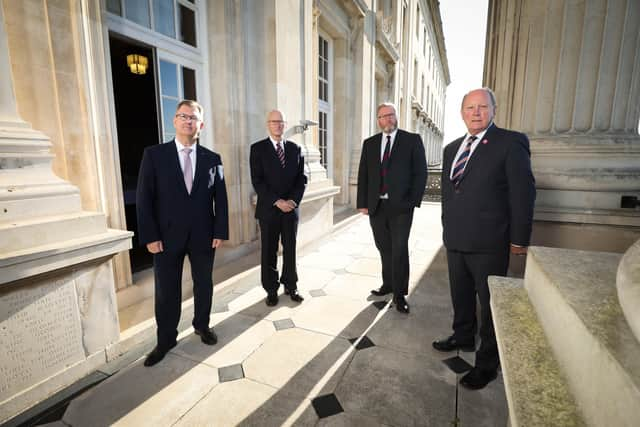The unionist parties come together to reject the Northern Ireland Protocol, and call for its replacement with arrangements that respect NI’s place in UK
and live on Freeview channel 276
The agreed position has been supported by the DUP, the Ulster Unionist Party (UUP), Traditional Unionist Voice (TUV) and the Progressive Unionist Party (PUP).
The statement says: “We, the undersigned Unionist Political Leaders, affirm our opposition to the Northern Ireland Protocol, its mechanisms and structures and reaffirm our unalterable position that the Protocol must be rejected and replaced by arrangements which fully respect Northern Ireland’s position as a constituent and integral part of the United Kingdom.”
Advertisement
Hide AdAdvertisement
Hide AdThe signatories are Sir Jeffrey Donaldson MP, DUP Leader, Doug Beattie MC MLA, UUP Leader, Jim Allister QC MLA, TUV Leader, Councillor Billy Hutchinson, PUP Leader.


There is no mention in the statement of an electoral pact, which is something about which the unionist parties have been unable so far to agree, with Mr Beattie saying he does not support such an approach.
In issuing the statement, the parties have also put out an explanatory note as to their thinking.
It reads: “Northern Ireland is a constituent part of the United Kingdom of Great Britain and Northern Ireland by reason of the Acts of Union 1800 and the continuing express will of its people.
“The Union is both economic and political.


Advertisement
Hide AdAdvertisement
Hide Ad“The Belfast Agreement set the conditions on this island for the operation of two separate jurisdictions in order to promote peace, reconciliation and place the people at the heart of any decisions that are made about the sovereign status of Northern Ireland. The Belfast Agreement gave assurance against change without consent and guaranteed equilibrium as between East/West and North/South arrangements. Yet, under the Protocol the East/West relationship has been severely undermined, again without consent. Furthermore, the Protocol is in conflict with the Acts of Union - as declared recently in the High Court.”
The explanatory note continues: “The economic union is grounded in Article 6 of the Acts of Union, which guarantees unfettered trade on the same footing between and within all parts of the United Kingdom. The Northern Ireland Protocol fundamentally alters the arrangements within the Belfast Agreement by making Northern Ireland subject to European Union laws and processes of a Single Market for goods, under a European Union customs code and VAT regime, with the rest of our nation decreed a “third country” when it comes to trade and the import of goods.
“Economically, the Protocol has inflicted grave damage on many business sectors, which will increase with the end of grace periods. The huge disruption of trade in the supply of goods from Great Britain to Northern Ireland has caused unnecessary supply chain disruption and unacceptable and unsustainable levels of bureaucracy and barriers to trade within our own nation. The resulting diversion and reorientation of trade is destructive of Northern Ireland’s place in the United Kingdom and will result in an economic realignment which is unacceptable.
“Through the Northern Ireland Protocol, the European Union asserts sovereignty over economic and trading matters in Northern Ireland, subjecting us to their laws - which we cannot change - and the rule of the European Court of Justice without local political representation, creating a major democratic deficit.
Advertisement
Hide AdAdvertisement
Hide Ad“We wish nothing more than good and practical relations with the European Union and the Irish Republic which is our nearest neighbour and with whom we share a frontier between the United Kingdom and the European Union. However, this cannot be achieved with Great Britain designated as a ‘third country’, with a regulatory border partitioning the United Kingdom, and subjecting Northern Ireland to European Union laws and jurisdiction.”
The note finishes as follows: “Thus, going forward, any agreement which fails to ensure a proportionate and equitable solution which respects the sovereignty of the United Kingdom and restores our unfettered place within the Internal Market, cannot command the support of the unionist community.”
——— ———
A message from the Editor:
Thank you for reading this story on our website. While I have your attention, I also have an important request to make of you.
With the coronavirus lockdown having a major impact on many of our advertisers — and consequently the revenue we receive — we are more reliant than ever on you taking out a digital subscription.
Advertisement
Hide AdAdvertisement
Hide AdSubscribe to newsletter.co.uk and enjoy unlimited access to the best Northern Ireland and UK news and information online and on our app. With a digital subscription, you can read more than 5 articles, see fewer ads, enjoy faster load times, and get access to exclusive newsletters and content. Visit https://www.newsletter.co.uk/subscriptions now to sign up.
Our journalism costs money and we rely on advertising, print and digital revenues to help to support them. By supporting us, we are able to support you in providing trusted, fact-checked content for this website.
Alistair Bushe
Editor